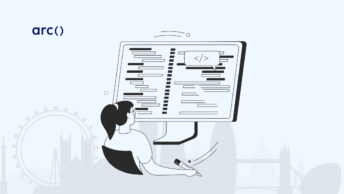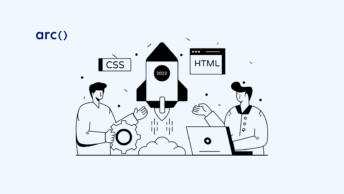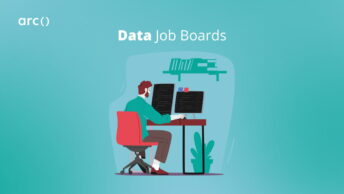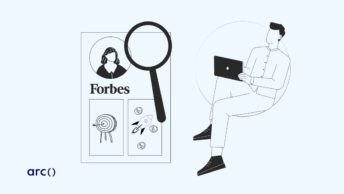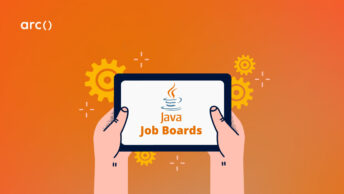Do you want to launch a career as a software engineer but unsure where to start?
In any profession, landing your first job can be a daunting milestone to reach. Whether you’re self-taught, a coding boot camp graduate, or have an educational background in computer science, there are many ways to become a software engineer.
Keeping in mind that feelings of uncertainty will no doubt arise, we’ve decided to provide an extensive guide on how to get a software engineering job!
From the basics, like salary, education pathways, and skills, to the more advanced questions, such as writing resumes and passing technical interviews, we cover it all below.
So, let’s get started, shall we?
The Software Engineer Career Path
While plenty of the skills that are required to have as software engineers are transferable between different roles, there’s a certain career trajectory that aspiring software engineers tend to have in mind.
Coding, programming, software engineering, and software development are incredibly easy to use synonymously, and, combined, they can include all kinds of positions. Understanding the differences among them is crucial for successfully planning the initial stages of your career.
Generally, working in software engineering means creating and implementing software and various utilities. However, compared to software development, software engineering is more about the design decisions and technologies chosen rather than the code that is programmed. The average software engineer uses a combined knowledge of computer science and some mathematics (along with what seems to be a generous helping of wizardry) to create software products that provide value to the digital needs of their target audience.
Before you can successfully navigate your chosen career path in software engineering, you need to decide what interests you and where your skill set would be the most applicable. Once you’re sure of that, you can start thinking about salary and the steps you’ll take towards your goal.
Software engineer salary
As with any job, there are various factors that influence the salary any given software engineer can expect. Their geographic location definitely plays a major role, as well as the years of professional experience they have.
According to salary data from Arc’s own database, the annual average salary for software engineers is $71,731. For junior software developers, the average salary is $59,553, while the average salary for senior software engineers is $85,949.
Read More: Best Online Developer Communities to Join in 2022
Seniority levels
While this can also vary depending on your specific company and industry, some of the seniority levels in the software engineering profession are:
Junior Software Engineer — These are entry-level positions, generally given to people with little to no experience, such as when coming straight from an internship or after earning a bachelor’s degree. Junior software engineers are expected to perform software development tasks according to client requirements and within a specific time frame. They report to their team leaders, who often act as mentors that guide junior developers. This is the part of your career where you obtain new skills and experience that’s essential for working on more complex projects and tasks later on.
Senior Software Engineer — A couple of years after landing your first junior position, you will be promoted to a senior software engineer. You will gain a better understanding of the software development lifecycle and master new programming languages. At this stage, you may also start managing your own team or training other junior software engineers. Also, this is the part where you’re first introduced to the business aspects of software development, like company-wide objectives and project budgets.
Tech Lead — The tech lead is responsible for managing the whole software development process. Once you reach this stage, you will have a substantial team of software design and development professionals to manage. Also, you will provide development progress reports to various company stakeholders and share your inputs in the decision-making process.
Team Manager — Those with a strong leadership disposition may progress into a more managerial role. In that case, you’ll be overseeing the career progression and wellbeing of your entire team.
Technical Architect — This job role entails overlooking the whole technical design and architecture of a project, as well as building processes for your team and providing them with technical leadership.
Chief Technology Officer — The CTO is the head of all the technical aspects of an organization. They supervise all R&D and use leverage technology to contribute to the company’s goals and profit targets. For a software engineer, aspiring to work with a CTO as a service can offer a unique opportunity to learn from a high-level industry expert.
Education
Do you need a degree to become a software engineer?
If you want to become a software engineer, having the right education ensures all the doors are open to you. Generally, a bachelor’s degree in software engineering, computer science, mathematics, or another technical field is ideal.
Today, some employers even require a master’s degree from certain job candidates, but don’t worry — this is rarely the case for junior positions! Also, some industry experience will elevate you from other candidates — for instance, someone looking for a job as a software developer in fintech will have a higher chance of landing the gig if they’ve already worked in fintech before. Why? Because mastering the skills required for fintech software development will equip you to contribute to innovative financial solutions and be at the forefront of shaping the evolving landscape of technology in the financial industry.
However, you should also keep in mind that there are no specific certifying exams or accreditations that are an absolute requirement for software engineers — which means other, less traditional pathways for education have emerged as well.
Read More: 15+ Best Job Board Websites for Software Engineers
University degree
As we mentioned above, a college degree is the most popular route towards becoming a software engineer. According to Stack Overflow’s 2020 Developers Survey, around 75% of all software developers have a bachelor’s degree or higher in appropriate technical fields.
There’s a reason why four-year degrees are so popular with both candidates and employers — they ensure that job candidates will have the widest elementary knowledge in computer science. These degree programs cover the basic theory and practice in computer science, provide candidates with a communal environment for learning, give access to various instructors, and facilitate the earliest networking opportunities.
Of course, a college education is more expensive compared to boot camps or self-taught methods. And while it’s harder to achieve your professional goals without a degree, it’s not impossible — more than 20% of professional software developers and engineers start without an undergraduate degree.

Coding boot camp
Coding boot camps provide budding software engineers with an opportunity to obtain a useful set of programming skills through a vastly accelerated curriculum compared to a college degree. Industry newcomers get a strong knowledge foundation and the skills they need for an entry-level role.
However, these boot camps are intense and require a lot of dedication, hard work, and energy. The courses tend to last between three and six months, and these days they’re quite flexible — you can often choose between in-person, virtual, and weekend options. For many people working part-time and full-time jobs, this is an important advantage over full-time college courses.
Bear in mind that coding boot camps most commonly focus on web coding — if you want to become another kind of software engineer, more formal education is likely the better choice. Still, if you’re looking to quickly obtain some coding fundamentals and enter the workforce ASAP, boot camps are certainly an option to consider.
Read More: How to Improve Your Dev Skills Even When You’re Super Busy
Self-taught
The third (and most difficult) option for educating yourself to become a software engineer is being self-taught. Today, the Internet is filled with all kinds of self-directed educational opportunities for people that are not as comfortable with formal academic options — or for those on a tighter budget.
Educational websites like freeCodeCamp or Khan Academy provide plenty of courses that can teach you the basics of computer science and various programming languages. These courses were specifically designed for self-instruction and flexible scheduling.
However, this level of flexibility doesn’t come without a cost. For one, choosing to learn independently means not having a formal instructor or a set schedule. And many people have a hard time keeping themselves productive and on track.
Software Engineering Skills
In order to be successful in a software engineering role, you should focus on building a specific spectrum of soft skills and hard skills.
Hard skills
As a software engineer, your primary function is to create functional software, apps, or web pages. To do this, you will require a host of technical skills that include, but aren’t limited to:
- Back-end and/or front-end coding knowledge
- Functioning within the agile development methodology
- Debugging and testing your own code
- Writing clean code with useful, clear comments
Soft skills
After landing your first software engineering job, it won’t take you long to realize that there’s more to this job than coding. As you advance, you will start leading teams, training others, and communicating with people from different departments.
To reach that level, you’ll have to know how to:
- Manage your time effectively
- Be a team player
- Communicate technical information
- Use their people skills and interpersonal skills
- Communicate across cultures
- Be self-motivated
- Collaborate effectively
People that excel in most of these areas go on to become highly coveted employees and a crucial part of any software engineering team.
Read More: How To Use Social Media To Level Up Your Developer Career
Most in-demand programming languages
While most software engineers are proficient in more than one programming language, it’s not easy for a beginner to figure out which ones will give them the most professional value. With that in mind, we’ve created a quick overview of the most in-demand programming languages on today’s job market:
JavaScript
You won’t find many lists of the most sought-after programming languages that don’t include JavaScript. Its enduring relevance makes it the first language a huge number of prospective software engineers learn — it’s a must for any web programming, and it’s one of the easiest ones to master.
Python
On the other hand, Python is another great common choice but more frequently used for data science and back-end development. It’s a hugely versatile general-purpose language that brings value to a variety of projects — it works with different programming styles, both object-oriented and functional. And much like JavaScript, it’s very easy to learn.
Java
Professional developers and engineers also frequently use Java — an object-oriented general-use language that’s particularly valuable for creating objects that include data and functions. Just like the others we’ve mentioned here, its main strengths are consistent demand in the job market, coupled with solid versatility.
HTML
HyperText Markup Language — more commonly known as HTML — is essential knowledge for just about any and all web developers, programmers, and software engineers. It’s quite accessible to newcomers, and it’s used to describe the overall appearance and formatting of web pages. Yes, its utility is far more specific than the other languages we’ve mentioned, but it’s still incredibly popular.
SQL
SQL (Structured Query Language) is another universally popular choice, used by programmers to manipulate and query databases. It’s a domain-specific language that’s mainly utilized in data management — it can be used to find, retrieve, add, remove, and update database contents. Today, it still ranks among the top three most used programming languages.
C#
Finally, there’s also C# — one of the most widely used object-oriented languages on the planet. Since its release by Microsoft in 2002, it’s remained a beloved improvement on C++; used for all kinds of desktop and web applications. In the future, it will likely stay in huge demand — especially because it’s used for building mobile applications and games.
Read More: How to Negotiate Your Salary as a Software Developer
Getting a Job as a Software Engineer
Once you’ve finished whatever type of education you’ve chosen to become a software engineer and obtained the necessary basic skills — it’s time for your job hunt to begin! In this part of the process, there are a couple of practicalities to keep in mind.
Resumes & Cover Letters
It’s generally better to spend more time on a couple of highly-tailored job applications than writing lots of low-quality ones. Remember, a software engineering cover letter or resume with grammatical errors or typos will be rejected immediately — they show a lack of attention to detail and give an impression of you not caring about the job you’re applying for.
Also, while a generic cover letter won’t necessarily be rejected right away, it won’t do you any good in a sea of applications. And in most cases, just a couple of minutes on the company website will help you come up with a real, genuine reason for wanting to work there.
Tailor your applications for every job ad instead of sending a generic one — and avoid copying templates you’ve come across online.
Read More: Full-Stack Developer Resume Examples & Tips for Writing One Well
Interviews
For a software engineering job, the social component of the interview is generally the less important one — even for some junior positions, you’ll have to demonstrate your knowledge in a technical interview.
Many companies organize this part of the job interview through whiteboarding. And while that’s far from ideal, you’ll probably need to become accustomed to working in the absence of a code editor for your interview. And even if the company doesn’t ask you to do this, they’ll probably go through some “trivia” — basic technical interview questions related to the job role.
But, while much of the focus may be on your technical skills, don’t forget to study up on general interview questions, as well! Later, after a few days, be sure to send a thank you email to your interviewer, also.
Read More: Common Interview Questions for Software Developer Jobs (Non-Technical)
Profiles (LinkedIn, Github) & Portfolio
Even if you’ve never held an actual job as a software engineer, creating a couple of (at least partially) completed personal projects is a great idea. These don’t need to be perfect at all — their point is to show your progress as a software engineer in the absence of work experience.
For instance, if your resume says you’re proficient in React, having a basic React app as a part of your online software engineering portfolio will attest to that. When applying for your first job, having at least three projects in your portfolio is the way to go.
Having a decent LinkedIn profile is also important, even if you don’t have any previous work experience. It’s something most interviewers will look up before they call you back — and the same goes for GitHub. In fact, many interviewers will go to your GitHub in the middle of the interview and ask you questions about the code from your projects.
Preparing for this part of the process is crucial.
Before going to the interview, make sure you can easily navigate around your Github projects and discuss the challenges you’ve overcome while working on each of them. And if you’re a complete beginner, all interviewers will be impressed if you know how to use Git for collaboration and version control.
On the Job as a Software Engineer
When you land your first job as a software engineer, there are two questions you’re probably asking yourself — what should I expect in a day-to-day sense, and how do I advance in my new career?
Day-to-Day Responsibilities
While the tasks you’ll be performing can vary wildly from project to project and depending on your employer, generally, you’ll be:
- Coding and designing software solutions within a team
- Fixing bugs and errors within existing code
- Monitoring and testing software performance
- Writing technical documentation pertaining to the code

How to Advance as a Software Engineer
As you’ve probably realized by now, there’s more to software engineering than mastering the right programming languages. There are several aspects of your job that you can focus on to stand out to your employers and advance from a junior position to a mid-level developer role within the company. If you want to advance quickly, you can:
- Do extra work that’s outside the immediate responsibilities you’ve been assigned
- Help other people on your development team
- Collaborate with other departments closely to understand their needs better
- Try to understand the wider business goals of your company and ask plenty of questions
- Actively ask for feedback that can help you improve your code
- Constantly network within software engineering communities outside your workplace
Read More: Where to Find Remote Junior Developer Jobs & Engineering Intern Roles
Software Engineering Career FAQs
With technology becoming increasingly embedded in every facet of our daily lives, software engineers are constantly given new and exciting career opportunities. The demand for all kinds of software developers is growing, and plenty of companies are looking to upscale their technology to remain relevant and competitive.
If you’re willing to dedicate enough energy, time, and money to educate yourself towards a software engineering career — you’ve definitely got high chances of landing an entry-level job. However, you’ll still need a lot of practice, self-education, coding boot camps, or a computer science background from college.
Software engineering is highly technical work — even if you don’t have much specialized training or a computer science degree, you’ll still need to have a basic understanding of computers and technology to even begin educating yourself in this field. Learning may be challenging in the beginning, but once you’ve mastered the basic concepts, you should have an easier time moving up.
Before the COVID-19 pandemic, remote work wasn’t as readily available as it is today, though software developers and engineers did have the luxury of having the most remote work availability. However, these days it’s far from being reserved for a few lucky freelancers — plenty of companies have decided on reducing costs and getting access to a global talent pool by switching to a virtual workspace. Check out all remote developer jobs available at top companies around the world over on our job board!
Wrapping Up
To learn even more about becoming a software engineer, check out these resources:
- 12 Common Mistakes Keeping You From Landing Your First Developer Job
- 5 Ways to Stand Out & Get Noticed in Your Current Development Job
- Questions to Ask at a Software Development Job Interview
- 8 Common Interview Mistakes Software Developers Make
- 8 Behavioral Interview Questions Asked by Top Tech Companies
We hope this guide helps give you a sufficient understanding as to the basics of how to become a software engineer or developer!
If you have any questions or feedback, feel free to leave us a message below, and we’ll reply as soon as possible. As always, we thank you for reading, and we wish you the best of luck on your software engineering career!
Oh, and if you haven’t yet, join Arc as a developer now to search all remote developer jobs in one place, get access to more great career advice, and network with remote software engineers, developers, and programmers around the world.







